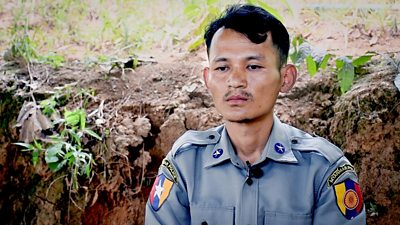

Suu Kyi was at the time heavily criticized over her siding with the military in its violent campaign against the marginalized Muslim Rohingya community.Īlmost 900,000 Rohingya refugees now remain stuck in squalid, crowded conditions in refugee camps in Cox's Bazar in southeastern Bangladesh. Thousands were killed, raped, tortured, or arrested in the crackdown, perpetrated with “genocidal intent,” according to the United Nations, which has described Rohingya as the most persecuted minority in the world. Speaking at an event hosted by the Foreign Press Correspondents’ Club of Japan in Tokyo on May 28, 2021, Christine Schraner Burgener, UN special envoy for Myanmar has warned of possible civil war in Myanmar. Members of the minority group in their thousands were forced to leave their homeland due to the military-led crackdown against their community in 2017. Some of those states that abstained from voting criticized the resolution for not adequately addressing the plight of Rohingya Muslims. General Assembly resolutions are not legally binding, though. The opportunity to reverse the military takeover is narrowing,” he told the assembly on Friday.Įuropean Union UN Ambassador Olof Skoog also said that the resolution “delegitimizes the military junta, condemns its abuse and violence against its own people and demonstrates its isolation in the eyes of the world." It is totally unacceptable.”Īnd UN special envoy on Myanmar Christine Schraner Burgener warned that “the risk of a large-scale civil war is real.” UN Secretary-General Antonio Guterres earlier pushed the body to act, saying, “We cannot live in a world where military coups become a norm. The NUG, comprised of activists, ethnic minorities and politicians from Aung San Suu Kyi’s National League for Democracy party which was ousted from elected power in a February 1 coup, is preparing to answer that call with. The mass rebellion has been met with a ruthless military crackdown that has killed over 860 people. As Myanmar’s crisis deepens amid a spiraling Covid outbreak, collapsing economy and repressive military coup, rising anger and insecurity are galvanizing calls for the shadow National Unity Government (NUG) to launch a nationwide armed uprising against the coup regime. These groups became especially influential during World War II, when the Empire of Japan promised an 'independent Burmese state' (though it would be de facto controlled by Japan as a puppet state ) and. Around 41 civilians, including several children, were killed by Myanmar’s junta during a raid on villages in Tabayin (also known as Depayin) Township, Sagaing Region, on Friday. Since the military putsch on February 1, protesters have been demanding the restoration of civilian rule and the release of their civilian leader Aung San Suu Kyi and her associates, who have been under arrest ever since. Before Myanmar (Burma) gained independence from the United Kingdom, several anti-colonial groups protested against British rule of the country. The resolution also urged the military to immediately stop all violence against peaceful demonstrators, who have been holding daily rallies against the coup. 37 states abstained, including China and Russia. Only one country, Belarus, voted against it. UN official warns Myanmar at risk of 'large-scale' civil war Although the organization’s Credentials Committee is stalling a decision on whether to recognize the junta, “the UN is unlikely to take any meaningful action against Myanmar’s new rulers because they have the support of China and Russia.”.

Yet, the AP reports this week that the United Nations sees itself as hamstrung in the situation.

As Betcy Jose and Peace Medie have shown, this is typical of how civilians begin to protect themselves with force when faced with violence from their own government, and in the absence of adequate outside help.Īnd when peaceful protesters begin to turn violent, military regimes typically respond with an even worse crackdown, causing the violence to escalate and the political contestation to slide into civil war. But over the summer, in reaction to the junta’s violent and often lethal response, hundreds of small, armed, civilian resistance groups popped up and begun to carry out ambushes on military convoys around the country. Up until the spring, the pro-democracy movement in Myanmar was mainly expressing its opposition to the military junta that seized power in February through peaceful protests.


 0 kommentar(er)
0 kommentar(er)
